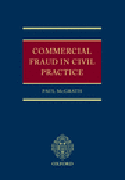
The book provides clear and practical guidance on the complex issues that arise in commercial fraud claims. By bringing together all current sources of legal thinking the author presents a coherent and readily accessible guide for the busy practitioner. Setting the scene with a discussion of the types of relationship which give rise to liability, including fiduciary relationships, the author then examines the liability of those who receive the proceeds of fraud. He considers the meaning of 'knowing receipt' and the nature of claims for unjust enrichment and constructive trusts. The work examines the availability of proprietary relief in the context of commercial fraud and assesses how best toapply the rules on tracing through modern means of money transfer such as BACS and CHAPS. McGrath concludes with a discussion of tracing, conflict of laws and procedure. INDICE: I:FRAUD-OVERVIEW; 1. Overview; II: FRAUD AT COMMON LAW; 2. Deceit; III: RECEIPT0BASED LIABILITY; 3. Unjust Enrichment; 4. Conversion; IV: RECEIPT-BASED LIABILITY - IN EQUITY; 5. Konwing Receipt; 6. Constructive trusts: Overview; 7. Consturctive Trusts: Unconscionable Conduct; 8. Constructive trusts: Abuse of Fiduciary Position; V: STATUTORY LIABILITY; 9. Overview; 10. Transfers at an Undervalue; 11. Transactions defrauding creditors; 12. Preferences; 13. Miscellaneous; VI: MULTI-PARTY LIABILITY; 14. Conspiracy; 15. Inducing a breach of contract; 16. Dishonest Assistance; 17. Bribery; VII: CONFLICT OF LAWS; 18. Conflict of Laws: Overview; 19. Conflict of Laws: Jurisdiction; 20. Choice of Law; VIII: TRACING, DISCLOSURE AND INJUNCTIONS; 21. Tracing; 22. disclosure; 23. Search Orders; 24. Freezing, Proprietary and Interim Injunctions.
- ISBN: 978-0-19-929057-4
- Editorial: Oxford University
- Encuadernacion: Cartoné
- Páginas: 744
- Fecha Publicación: 01/12/2008
- Nº Volúmenes: 1
- Idioma: Inglés
